Notes
- ↑ Goode, Kenneth (2008-10-01). Profitable Showmanship. Read Books. ISBN 9781443745628.
Showmanship, concerning artistic performing such as in Theatre, is the skill of performing in such a manner that will appeal to an audience or aid in conveying the performance's essential theme or message.
For instance, the Canadian stage magician Doug Henning used many classic illusions in his magic show. However, he made the old material seem new by rejecting the old stylistic cliches of the art (such as wearing formal wear), and by presenting them with a childlike exuberance that respected the audience's intelligence.
Profitable showmanship frequently appeals to pathos. Showmen aim to display goods with tact in order to sell an object or a show. [1]

Charles Edward Anderson Berry was an American singer, guitarist and songwriter who pioneered rock and roll. Nicknamed the "Father of Rock and Roll", he refined and developed rhythm and blues into the major elements that made rock and roll distinctive with songs such as "Maybellene" (1955), "Roll Over Beethoven" (1956), "Rock and Roll Music" (1957), and "Johnny B. Goode" (1958). Writing lyrics that focused on teen life and consumerism, and developing a music style that included guitar solos and showmanship, Berry was a major influence on subsequent rock music.

Władziu Valentino Liberace was an American pianist, singer and actor. He was born in Wisconsin to parents of Italian and Polish origin and enjoyed a career spanning four decades of concerts, recordings, television, motion pictures and endorsements. At the height of his fame from the 1950s to 1970s, he was the highest-paid entertainer in the world with established concert residencies in Las Vegas and an international touring schedule. He embraced a lifestyle of flamboyant excess both on and off stage.
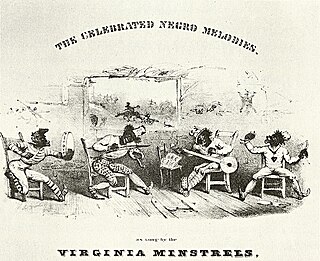
The minstrel show, also called minstrelsy, was an American form of theater developed in the early 19th century. The shows were performed by mostly white actors wearing blackface makeup for the purpose of comically portraying racial stereotypes of African Americans. There were also some African-American performers and black-only minstrel groups that formed and toured. Minstrel shows stereotyped blacks as dimwitted, lazy, buffoonish, cowardly, superstitious, and happy-go-lucky. Each show consisted of comic skits, variety acts, dancing, and music performances that depicted people specifically of African descent.
Showmanship may refer to:

Jim LeRoy was an American aerobatics pilot. He died upon impact in a crash at the Dayton Air Show in Ohio.

John Henry Anderson (1814–1874) was a Scottish professional magician. Anderson is credited with helping bring the art of magic from street performances into theatres and presenting magic performances to entertain and delight the audience.
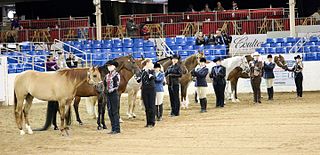
Showmanship is an event found at many horse shows. The class is also sometimes called "Fitting and Showmanship", "Showmanship In-Hand", "Showmanship at Halter" or "Halter Showmanship" It involves a person on the ground leading a horse, wearing a halter or bridle, through a series of maneuvers called a pattern. The horse itself is not judged on its conformation. Exhibitors are judged on exhibiting the animal to its best advantage, with additional scoring for the grooming and presentation of both horse and handler.

Junior showmanship is a sport for young people in which they exhibit their dog handling skills in an event similar to a conformation dog show. Unlike a conformation show, it is the young handlers who are judged, not their dogs.
WFCN is an AM radio station broadcasting at 1200 kHz. Licensed to Nashville, Tennessee, it airs a Christian radio format. WFCN is owned by the Chicago-based Moody Bible Institute and it simulcasts its sister station in nearby Murfreesboro, Tennessee, 91.7, WFCM-FM. Programming on WFCN is rebroadcast on FM translator 98.7, W254CK.
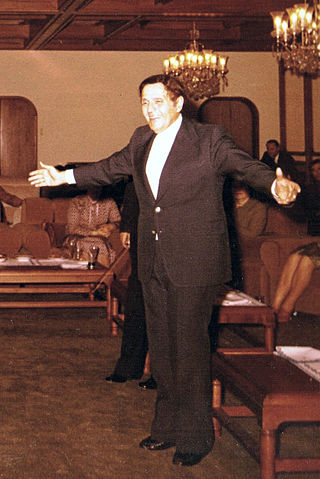
Gică Petrescu was a prolific Romanian folk music composer and performer.
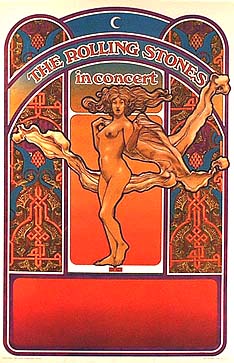
The Rolling Stones' 1969 Tour of the United States took place in November 1969. With Ike & Tina Turner, Terry Reid, and B.B. King as the supporting acts, rock critic Robert Christgau called it "history's first mythic rock and roll tour", while rock critic Dave Marsh wrote that the tour was "part of rock and roll legend" and one of the "benchmarks of an era." In 2017, Rolling Stone magazine ranked the tour among The 50 Greatest Concerts of the Last 50 Years.
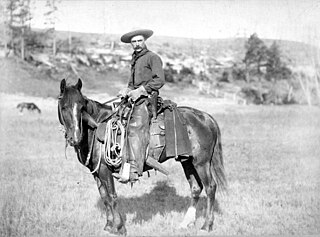
Western riding is considered a style of horse riding which has evolved from the ranching and welfare traditions which were brought to the Americas by the Spanish Conquistadors, as well as both equipment and riding style which evolved to meet the working needs of the cowboy in the American West. At the time, American cowboys had to work long hours in the saddle and often over rough terrain, sometimes having to rope a cattle using a lariat, also known as a lasso. Because of the necessity to control the horse with one hand and use a lariat with the other, western horses were trained to neck rein, that is, to change direction with light pressure of a rein against the horse's neck. Horses were also trained to exercise a certain degree of independence in using their natural instincts to follow the movements of a cow, thus a riding style developed that emphasized a deep, secure seat, and training methods encouraged a horse to be responsive on very light rein contact.
Celine Dion in Concert was the fourth concert tour by Celine Dion. The tour consisted of 51 shows held between 13 July 1992 and 13 May 1993. It was organized to support her eleventh studio album Celine Dion (1992).
Orchestral jazz or symphonic jazz is a form of jazz that developed in New York City in the 1920s. Early innovators of the genre, such as Fletcher Henderson and Duke Ellington, include some of the most highly regarded musicians, composers, and arrangers in all of jazz history. The fusion of jazz's rhythmic and instrumental characteristics with the scale and structure of an orchestra, made orchestral jazz distinct from the musical genres that preceded its emergence. Its development contributed both to the popularization of jazz, as well as the critical legitimization of jazz as an art form.

The Fearless Tour was the debut concert tour by the American singer-songwriter Taylor Swift, who embarked on it to support her second studio album, Fearless (2008). It was her first headlining concert tour after she had opened shows for other musicians to support her 2006 album Taylor Swift.

"Pilot" is the first episode of the American television series Glee. It premiered on the Fox network on May 19, 2009. An extended director's cut version aired on September 2, 2009. The show focuses on a high school show choir, also known as a glee club, set within the fictional William McKinley High School in Lima, Ohio. The pilot episode covers the formation of the club and introduces the main characters. The episode was directed by series creator Ryan Murphy, and written by Murphy, Brad Falchuk and Ian Brennan. Murphy selected the music featured in the episode, with the intention of maintaining a balance between showtunes and chart hits.
The For Those About to Rock Tour was a concert tour by the Australian hard rock band AC/DC, in support of their eighth studio album, For Those About to Rock We Salute You, which was released on 20 November 1981.

The Doo-Wops & Hooligans Tour was the first headlining concert tour by American singer and songwriter Bruno Mars. Launched in support of his 2010 debut studio album Doo-Wops & Hooligans, the tour was announced in October 2010 and included dates in North America, Europe, Asia, Oceania, the Caribbean and South America.
Stars over Hollywood is a radio anthology in the United States. It was broadcast on CBS from May 31, 1941, to September 25, 1954, sponsored first by Dari-Rich, Carnation Milk and later by Armour and Company.
Leonard Rutherford was an American old-time fiddle player from Kentucky, United States. He was a full-time live-entertainer and recording artist, but lacking any inclination for showmanship he performed in partnerships. For thirty-five years he toured with banjoist Dick Burnett, making a number of highly regarded recordings in 1926–1928. He formed a shorter recording partnership with guitarist and singer John D Foster but continued to play with Burnett. Rutherford was born in Somerset, Kentucky and lived most of his life in Monticello, Kentucky.